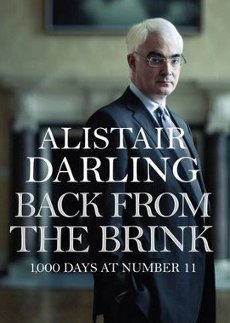Alistair Darling is sitting alone in the Green Room at Henley before appearing in a talk, sponsored by Baillie Gifford, about his book,‘Back from the Brink’. He has no publishers, no entourage with him, and as far as I can see, no notes. In an open-necked shirt, without his glasses, he looks so much younger than during the banking crisis that I wonder if I am approaching the wrong man.
Fortunately, it is the former Chancellor of the Exchequer, now a backbencher, and he seems pleased I enjoyed ‘Back from the Brink’, about his 1000 days as Chancellor. He wrote it alone, completing it on the second draft. It is a good read, providing a fascinating insight into the decline of his friendship and working relationship with Gordon Brown.
These days, he also looks very different from the bearded ‘sandal-wearing, car-hating Loony Leftie’ as he was once described. Among other things, he once called for all the UK banks to be nationalised. Have his views changed with age? He says that although his core beliefs have not changed, he is “essentially a pragmatist. I do feel there’s an element of going into government to help people and that has always been the case. I suppose the financial crisis is an example of where we could not just stand back. If our government and others had not intervened, everything would have collapsed.”
As Chancellor he worked closely with the banks, notably RBS and HBOS, to save them. It was perhaps a little ironic, given the banks and city’s initial mistrust of Labour, that the two ended up spending so much time together, as the book makes clear. “The city’s traditional attitude was ‘we don’t need government help’ but when it came to it and the entire edifice was about to collapse, the only people who could stop it from collapsing were the government or governments. The bank bailout worked because we did more than people expected, and we did it quickly. If Gordon hadn’t expended an awful lot of energy going round the world, locking the leaders in the room together at the G20 summit at the Excel centre, we would never have reached an agreement.”
Did he really lock them in? “Not quite, but it was obvious this meeting was not going anywhere and so he ordered all the staff out and stood in front of the door and said “Right, we’re not going till we have an agreement”. ”
Our conversation moves on to bank regulation. He thinks the risk of impending regulation requiring UK banks to hold a certain amount of capital so that it acts as a brake should the Government have to step in to rescue the economy again, is far less worrying than the danger of several European banks’ overexposure to loans for countries like Greece. Incidentally, he cannot understand why Eurozone governments are letting Greece burn. In the UK, he believes British banks are more at risk from an economic slowdown hitting house prices and other assets, in turn reducing the assets on the banks’ balance sheets.
He believes that while the present government has no choice other than to get the level of government borrowing down if everything is done all at once, the economy will stop growing. Most of Europe can’t buy our exports, and the private sector cannot take up the slack left by cuts in the public sector, he argues. There is a real risk, he adds, that at best we will see a stagnant few years and that Europe as a whole will slip into recession. Even allowing for his reputation as Eeyore, this is depressing.
He was one of the few in the Labour party who appeared to recognise as early as 2004 that public expenditure was ballooning. Why did he not blow the whistle? He quotes deficit reduction figures and comparative figures and argues that capital investment in our outdated infrastructure was essential, but admits the mistake was to underestimate the extent to which the consumer boom was predicated on rising house prices and to assume that the revenue from financial services (25% of corporate tax revenues) would keep on rolling in. “We are so dependent on financial services,” he says. “When people say, you’ve got to rebalance your economy, that’s fine. The trouble is that we lost almost all our manufacturing 30 years ago. ”
We discuss the impact the current downturn is having on young people: he has two children, a son training to be a lawyer (as was he), and a daughter still at university. He is astonished when I tell him how few of my son’s year had jobs when they graduated and repeats the statistic on stage. “If a child’s – and they are still children -the first experience is unemployment, it will stay with them, especially if it’s for two or three years. By the time the recovery comes, companies will be going straight to graduates coming out of universities.”
The concern is genuine. He is a good constituency MP for Edinburgh South West, I imagine, although he must have struggled to be there very much until he returned to the back benches. On stage, however, the true politician is revealed. Angling his chair to face the audience, completely relaxed, he displays the quick wit and easy humour for which he was known at the Treasury. He is enjoying himself immensely.
A senior banker suggested to me that perhaps Alistair was not brutal enough to push people around at the top of the Labour party. Can you remain a nice person and be an effective politician? “Of course you can,” he replies. “It is nonsense that you have to be a ruthless brute although I think if you want to be liked, you should go and do something else. People have to respect and trust you and think you’re doing the right thing. Margaret Thatcher, for example, was someone very few people would claim to have liked. But she kept winning because people respected her. I just think whatever business you’re in, you have to be yourself but as my mother always used to say, “Politeness doesn’t cost anything”.
Alistair Darling was interviewed before speaking at a Baillie Gifford-sponsored event at Henley in September 2011





